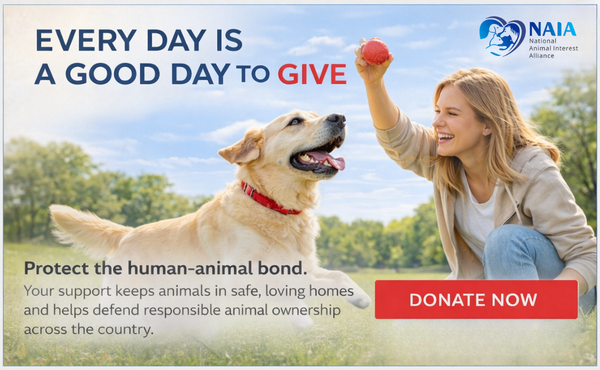Dog owners and fanciers are facing an onslaught of restrictive laws at state and local levels throughout the country. Animal rights activists promote breeder restrictions in the guise of consumer protection laws and solutions to shelter euthanasia; their emotional and distorted campaigns make it difficult to distinguish between reasonable laws and those that trade on compassion, fear, guilt, or political agendas.
Activists peg their legislative attempts on partial truths: some breeders have poor kennel conditions, sell sick or unfit puppies or kittens, and refuse compensation to the buyers, and many healthy dogs are euthanized in animal shelters. They then stretch these truths to impose breeding licenses, differential license fees for intact dogs, and kennel standards that interfere with legitimate breeders and fail to address the euthanasia rate. And many breeders, shelters, councils, commissions, and state legislators fall for the ruse.
Activists are patient; they may back moderate legislation in hopes of adding amendments later or influencing the rules written to implement the law.
A comparison of two recent legislative attempts supposedly written to hold breeders responsible for the health of the puppies and kittens they produce and to protect buyers if the pet is sick or unfit show the span of language and attitude that activists use to achieve their goals. One appears to hold commercial breeders to standards of professionalism; the other treats breeders like criminals.
The New Jersey bill (A2612) was written by the state's humane society and the Humane Society of the US; the Washington state bill (HB 1994) is a result of a recent puppy mill case in which more than 200 dogs were confiscated from a kennel; it is supported by the Progressive Animal Welfare Society, the organization behind breeder permits and intact dog licenses in King County, Washington. The New Jersey bill was withdrawn before a vote; the Washington bill is awaiting committee assignment.
Both bills demand the registration of commercial breeders, but the definition of commercial breeder differs considerably. In Washington, a commercial breeder is one who "owns or operates a facility that sells or offers for sale more than five litters of dogs and cats" per year. In New Jersey, a commercial breeder is one "who owns or operates a breeding facility and sells or offers for sale more than five dogs or cats per year."
A New Jersey breeder would need a license to produce a single litter if there was a chance that more than five puppies would be available for sale. A breeder could shrug and go along, except that the license gives the state the right to inspect the breeding facility (including the house) and require 11 different kennel standards, including
-
Maintain indoor temperatures between 50 degrees and 80 degrees for dogs over eight weeks of age and between 65 degrees and 80 degrees for puppies and kittens up to eight weeks;
-
Circulate air at least eight to 12 times per hour;
-
Provide indoor-outdoor runs of specific sizes for dogs and individual enclosures of specified size for cats;
-
Provide 20 minutes of unleashed exercise per day for dogs.
The kennel standards were written by HSUS.
The Washington bill exempts hobby breeders from any standards as long as they do not attempt to sell more than five litters per year. It establishes an advisory committee the includes a veterinarian, two registered breeders, two representatives from a state animal control association, and two members of the public to assist in writing kennel standards.
Both bills require wholesome food, potable water, and veterinary care.
Obvious Bias
The New Jersey bill prohibits licensed breeders from
Breeding littermates to each other;
Breeding a cat or dog more than once a year (male or female);
Selling more than 25 cats or dogs per year as pets;
Selling puppies and kittens less than 10 weeks of age to pet shops.
Thus, according to the bill, a breeder who produces one or two litters a year must be licensed if there's a chance that more than five puppies or kittens will be sold. The breeder must use a different stud for each litter, cannot do a test breeding of littermates, cannot breed a bitch twice in one year, and cannot offer a dog or cat at stud for more than one breeding. Technically, a breeder with an accidental litter produced by littermates would be in violation.
Breeders who violate the New Jersey bill would be subject to a civil penalty of $5000 and a five year ban on sale of dogs and cats for a first offense. Subsequent violations bring a penalty of $10,000 and additional five-year bans. Anyone else who commits a violation is subject to $1000 fine for a first offense, $2500 fine for a second offense, and $5000 fine for subsequent offenses.
Hearings are held only at the request of the accused person. The burden of proof is on the accused to prove he is innocent, not the authorities to prove he is guilty.
Although pet stores would not face the severe fines and restrictions that breeders would face under the New Jersey bill, they would be required to keep animals in the store for no more than eight weeks. If a puppy or kitten is not sold in that time, it must be given to the animal control agency or shelter in the city or township.
The Washington bill adds the commercial breeder license to a list of other business licenses required by the state and assesses the same penalties for violations by breeders that apply to opticians, naturopaths, radiologic technologists, and other license holders. In addition, breeders can have a license denied or revoked if they have been convicted of cruelty to animals or have violated any other state animal protection law.
However, the Washington bill's five-litter limit does not allow for breed differences. A breeder of dogs that have small litters may produce more than five litters and have only a handful of puppies to sell, and a breeder of fewer than five litters can have poor kennel conditions or unhealthy puppies.
What you can do
- Be alert. The New Jersey bill died before a vote because the New Jersey Federation of dog clubs alerted fanciers and the letters and calls poured in to the legislature. Fanciers are also submitting position papers and lobbying legislators in Washington, and that bill may die without a committee assignment. However, activists are patient; they have plans to introduce similar bills throughout the country.
- Contact your local representative to your state legislature and find out how to get on a list of people to notify when animal-related bills are proposed.
- Keep in touch with county, city, and other local officials in case a kennel licensing bill comes up in your back yard
 |
Like this article? Don’t forget to share, like or follow us |
 |
NAIA WEEKLY ROUNDUP
FEATURED & LATEST ARTICLES
GET THE NAIA WEEKLY ROUNDUP VIA EMAIL FOR FREE
Stay Connected with The NAIA: Sign Up for The Weekly Roundup
Join our FREE newsletter and community of animal advocates and receive The NAIA Weekly Roundup straight to your inbox. Stay in the loop with the latest news, events, and ways you can make a difference in the lives of animals. Sign up now to stay informed to create positive change!
Sign Up




 Farm Bill, Free Spay & Neuter Vouchers, Another Dog Steals the Show, and More!
Farm Bill, Free Spay & Neuter Vouchers, Another Dog Steals the Show, and More!
 Dogs, Veterinarians, Elephants, and More!
Dogs, Veterinarians, Elephants, and More!
 Copper Overdose at the Zoo, Owner of Killer Dogs Found Guilty, and More!
Copper Overdose at the Zoo, Owner of Killer Dogs Found Guilty, and More!
 The Great Veterinarian Shortage: Farm Edition, Elephant Rampage, and More!
The Great Veterinarian Shortage: Farm Edition, Elephant Rampage, and More!



